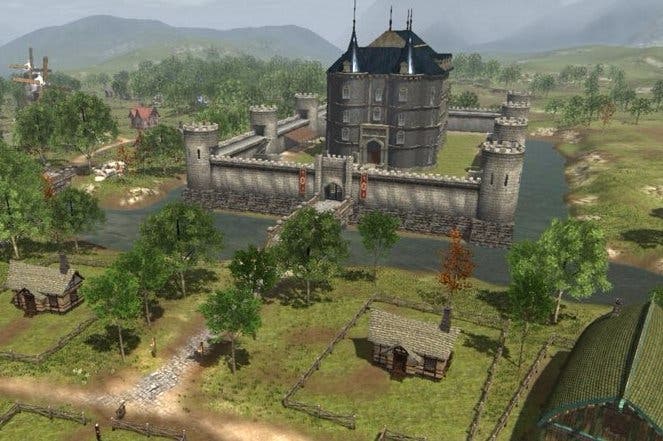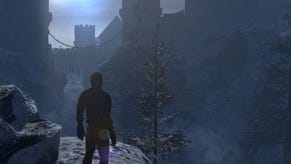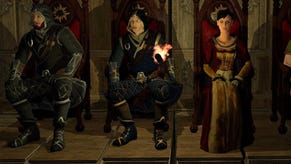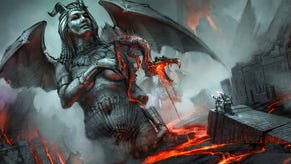$12,000 castles and $2100 deeds - inside Shroud of the Avatar's booming housing market
The unreleased game with a property market more crazy than London's.
The housing market is out of control. Look at the horror stories that come from London, about beds in cupboards that cost £500 a month to rent - and they're not even Harry Potter themed. But people want to be where the action is, so demand outstrips supply. Real estate in desirable locations: it's the most desirable thing. And Richard Garriott is banking on it.
He's asking for hundreds, even thousands of dollars from you in return for real estate in his new game Shroud of the Avatar. And it's working. Shroud of the Avatar has become the second highest-earning crowdfunded game behind Star Citizen, with a huge portion of its income - $6m of $8m so far - attributable to the game's online Add-On Store, which is dominated by all things real estate: deeds to land, houses themselves, bushes, shrubbery, decorations, statues. You can buy a $10 Wooden Outhouse, a $10 Ornate Tile Hot Tub (on offer, reduced from $15!), or a $150 Druid Town House that looks like a home carved out of a gnarled old tree. You can buy some cupid pants and wings in time for Valentine's Day. The Shroud of the Avatar Add-On Store is like an expensive medieval Sims catalogue.

And yet Shroud of the Avatar isn't even finished yet. It's in pre-alpha, available via Steam Early Access, and characters are still being periodically wiped while features are added. It won't be ready until sometime this summer. People are still happy to lay down money on property in a market that doesn't properly exist. I find that remarkable, and I wonder how on earth Richard Garriott decided a castle in his game was worth $12,000.
The first answer I half expect: Chris Roberts of Star Citizen fame helped him along. It's not surprising given the similarities between buying spaceships with real money and buying houses with real money. But the second answer surprises me: Ultima Online, arguably Garriott's most famous work. But it's 20 years old now - how can that be a template for a game in 2016? Because of Trinsic.
Trinsic was just another city in the game. It was nothing special as far as Garriott and his team were concerned. But it became the epicentre of player-housing, the London or New York of the game, and all because the forges there were conveniently placed. It meant blacksmiths liked being there which meant miners liked being there which meant shoppers liked being there, and soon business was booming, money overflowing, and where better to plonk your house with rented shopkeeper? Real estate value outside the gates of Trinsic (you couldn't build inside a city in Ultima Online) soared, and soon real money was changing hands.
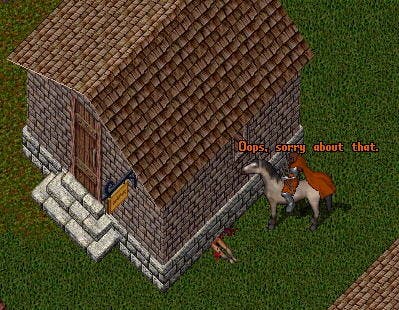
"It was very common for, within a few months of launch, the one-house-sized plots of lands [outside Trinsic] to sell on eBay for about $10,000," Richard Garriott tells me. "And that's because if you wanted to be in retail, 'location, location, location' is what really makes the difference. And a lot of these people were selling these plots for real money and not in-game gold, and even if they were selling for in-game gold they became fabulously wealthy by having that piece of property that was right in front of the gate at Trinsic.
"Regional value popped up frankly by accident in Ultima Online," he says. "We did not foresee it and we had no plan to shepherd it." But with Shroud of the Avatar he has a historical lesson to learn from and to build upon. "Now we know that will be the case," he says.
That's not to say you have to pay $12,000 to get on the property ladder in Shroud of the Avatar. Prices go right down to $100, and I'll explain what that gets you in a minute. But there is an emphasis on spending something. "To be a property owner you really need to be into the game for $100-$150," says Garriott. Well, I don't like anyone telling me I have to do anything, let alone pay an extra $100, but I'll come back to that because it's not quite as clear-cut greedy as it may seem.
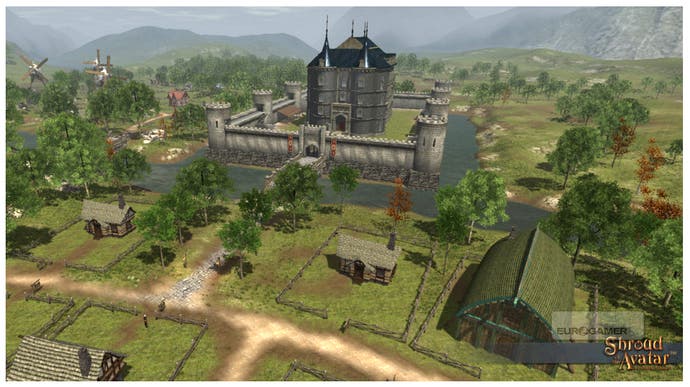
It's important to mention that it is possible to buy and own real estate in the game just by playing the game and not by spending extra real world cash. "We're going to say if you're a 40-hour-a-month gamer, which we think is a very active gamer, you should be able to be a property owner for no load," says Garriott. "We think at that point your value to the community is all we need from you."
You can also be a nomad adventurer or "vagabond" as Garriott calls me - because I suggest that's how I like to play - and not own a house at all. You have plenty of bank space and can purchase more if needs be. "If you want to be a vagabond and just run around and play the story and have a good time, more power to you," he says.
But if you have eyes on owning something grand and aren't, say, a thriving merchant combining forces with other merchants (because having your house double as a shop, as in Ultima Online, will be a key use of property besides being a storage dump and walk-in trophy cabinet - and, obviously, a status symbol) then you should think about getting your purse out. Not least because some things are exclusively available to real money buyers, things like keeps and castles, but also because real estate space in the world is running out, and real-money buyers get priority placing, which sounds invaluable to me. Then there's the opportunity to buy real estate that will be rent-free forever, because, oh, didn't I mention? Shroud of the Avatar charges rent.

Before I go on I'd better explain housing in Shroud of the Avatar better. The most precious things are deeds, which entitle you to lots, upon which you put a house. Deeds relate to certain sizes of lot in certain sizes of settlement, so a deed to a village lot entitles you to space in any of the game's villages, for example. You will only be charged rent when you use your deed to claim a lot. If it sits in your inventory unused, that's fine - no charge.
You can put many different kinds of houses on lots providing they fit the lot type you're putting them on, and you can even expand below with basements. Row lots are the smallest patches of land measuring 10x15 meters, followed by village lots at 20x30m, town lots at 30x40m and then city lots at 40x60m. Keep lots are twice city lots in size, and castle lots are quadruple city lots in size.
You can own a variety of houses and they will be stored safely by the game when not in use. Similarly, if you fail to pay your rent and your lot is repossessed, your house won't be lost but automatically go into safe storage, and your deed will go back to you for use elsewhere. "We'll never take stuff away from you but if your stuff is not popular enough to be self-supporting it will be erased from the map and go back to the bank," says Garriott. "The only way you can lose something of real value is to give it away to someone on purpose."
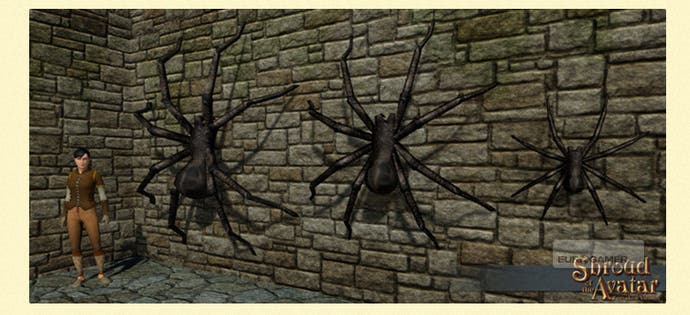
Deed prices scale from row deeds ($100) through village ($200), town ($900) and city ($2100) deeds, and all come with an appropriately sized wood and plaster house. Row lots can be found in villages, towns and cities, incidentally - they're like terraced housing. Keep and castle deeds are exclusively part of the $5300 and $12,000 pledge tiers and come with a whole bundle of other bits and pieces including tax-free deeds to smaller lots. All pledge-given real estate is tax-free, and those pledge tiers will disappear after the game's final wipe expected 28th July 2016. From then on all characters and lot selections will be permanent.
How much rent you'll be charged isn't nailed down because, and this so sums up for me what Garriott is trying to achieve with his little toy world in a fantasy bubble, the value of gold hasn't settled yet. "We haven't set the final number because we don't really know what the value of a gold piece is until the economy has been running a little longer," he says. "But the intent is that if you're an active player fighting and mining and trading, you should be able to pay for a row lot - it's plenty, plenty of space for you to collect and display all of the trophies of your existence - with 10 hours a month or so of your time." There will also be the option of paying rent with real money.
Imagine explaining to a friend who only has a casual interest in games that you're spending hundreds of pounds on a house in a fantasy world. What would they say - that you're crazy? It does seem it a bit mad when you take a step back, and yet real estate in Shroud is being snapped up. According to the Add-On Store all 450 pre-release village deeds ($200) have sold, and there are only 25 town deeds ($900) and six city deeds ($2100) left - although plenty of row deeds (681) remain. How many castle and keep deeds have sold I don't know, but there's a "sold out!" stamp on one $11,000 castle-giving pledge tier.
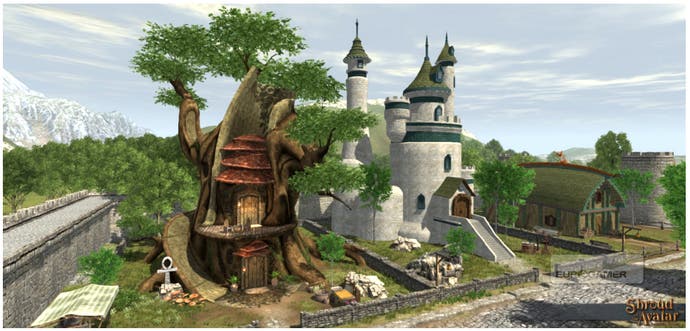
Even entire player-towns are selling - "we only thought we'd sell a dozen, and almost immediately 100 people picked them up" - and they range from holdfasts ($900) to hamlets ($1450), villages ($1800) to crossroad villages ($2400), and towns ($3600) to cities ($4800). The biggest, though, is a Metropolis ($9000), a gigantic area with 83,400 square meters of housing lots to dish out or charge for - up to you, you're the mayor. You can think it over from the parapet of your castle while you make up names and stories for your AI merchants and decide whether you want open combat (PVP) in your streets. Hint: yes you do.
Naturally the housing advantage is with early buyers but don't panic if you want to wait and are worried you will miss out. You're hardly being unreasonable, after all. "If you wait until the game has launched, we're going to make sure there's plenty of property for you to have access to," Garriott says. And in the future the world will grow with new cities and areas via game expansions every 18 months or so - that's the generous estimate Garriott gives me (though he'd love one every year). The sky is really the limit with what's possible; imagine owning a dungeon or an island or a continent... "There's no question those things are high on our radar too," he says.
But whatever happens make no mistake: "Real Estate is the most precious material of the game. We don't want to swamp the world with new territory, with new lots, that suddenly those lots people paid a lot of money for are worthless; conversely we don't want [prices] to sky-rocket either. We will do our best to make sure it doesn't get out of control."
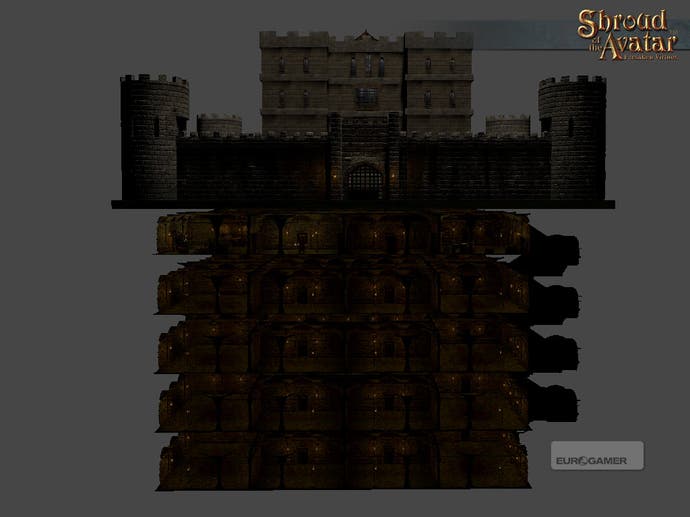
I said I'd come back to greediness because Richard Garriott says something that softens me up to spending an extra $100-$150 on his game. He says, "You could also look at it as a kind of subscription fee, something Ultima Online had." Ultima Online charged $15 a month, as have many games like it, and I've never really minded or noticed those fees, presuming them necessary contributions to ongoing development. Plus, if I'm into an online world I'm not normally playing much else. But Shroud of the Avatar doesn't have a subscription fee. "So all we're saying is pay us upfront for effectively a year's worth of subscription and you can have your property forever for no additional fee," says Garriott. "We think we've sold property now that is no worse than the subscription fees of the past."
Directly selling big-ticket items, such as houses, also takes power away from the black market that will inevitably surround this game as it has all other online worlds I can think of, because what will you need it for? I gave gold sellers hundreds of pounds in order to acquire things in World of Warcraft I didn't have time to grind for, as did Richard Garriott, it turns out - "I did, I confess, buy plenty of gold from gold farmers," he says. But what would you need that gold for in Shroud of the Avatar? If you want a house and many other things you can simply buy them direct from the Add-On Store. Or if it's gold you're after then why not invest in property and sell that to another player in the game for gold? It's a free market. The only thing you can't do is cash-out of the game for real money. "That would get us into money-laundering legal issues and that we're not going to do," Garriott says.
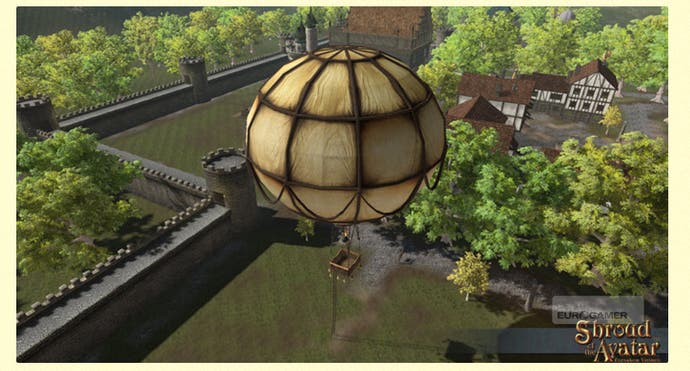
I don't have an answer for you here; I'm not here to tell you whether selling housing in Shroud of the Avatar is good or bad, won't work or will, because who am I to judge? People are already spending money and confirming the idea in a more tangible way than my words ever will. It's your money, do with it what you will. But I hope in shining a light on it I will chase away some preconceptions, like those I had myself, and help you understand something that's a bit weird, a bit different - just as I suppose Ultima Online was all those years ago. Just as I suppose Richard Garriott is. But that's what makes him and his work stand out, doesn't it? And I'm not sure I'd have it any other way.
This will be a big year for Richard Garriott, as Shroud of the Avatar nears a feature-complete launch sometime this summer. There may not be much fanfare, and it will arrive with a rolling start and long future in mind, but it will be the first time we've been able to see his idea in full. Will it work? Can it be a hit? Whatever it is I'm hopeful it will at least be interesting, because even now I can see stories in this game, in this social experiment, like I see few places else.
